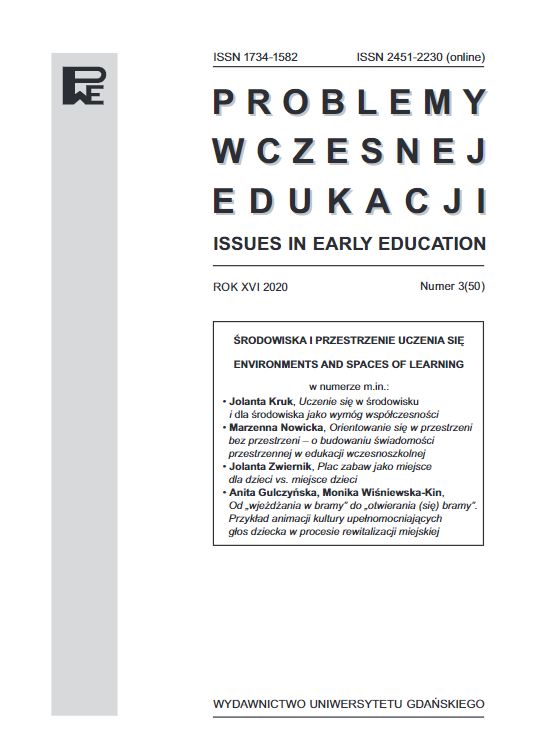How can I improve the environment to support the emergent curriculum?
DOI:
https://doi.org/10.26881/pwe.2020.50.08Keywords:
early childhood curriculum, early childhood environment, emergent curriculum, action researchAbstract
This Action Research (AR) project aims to answer the question “How can I improve the environment to support the emergent curriculum within the toddler room?” It utilises Kemmis and MacTaggart’s Action Research Spiral. The researcher, two team members and 24 children aged 18–30 months participated. The research took place in the researcher’s place of work: a non-profit community childcare setting. Data was gathered over two cycles of Action Research through observations of the children within the setting, field notes and focus group meetings throughout the project over a six-month period. The project demonstrated the power of the environment to support children’s learning and development and to enable them to be the instigators of their own learning. It highlighted the key role of the educator in providing this environment, ensuring it is inclusive and accessible to all children and in engaging in continuous reflective practice as a team with the aim to improve and make meaningful changes. Partnership with parents in creating an environment that supports the diversity of our classrooms also arose as an important finding.
Downloads
References
CECDE (Centre for Early Childhood Development and Education) (2007), Siolta Research Digest Standard 7: Curriculum. http://www.ncca.ie/en/Practice-Guide/S-olta/Building-ResearchDigests-linked-to-the-above-Standards.pdf, 8.10.2018.
Curtis D., Carter M. (2015), Designs for Living and Learning: Transforming Early Childhood Environments. 2nd ed. St Paul, Redleaf Press.
Daly L., Beloglovsky M., Daly J. (2015), Loose Parts Inspiring Play in Young Children. St. Paul, Redleaf Press.
DCYA (Department of Children and Youth Affairs) (2016), Diversity, Equality and Inclusion Charter and Guidelines for Early Childhood Care and Education. http://aim.gov.ie/wp-content/uploads/2016/06/Diversity-Equality-and-Inclusion-Charter-and-Guidelines-for-Early-ChildhoodCare-Education.pdf, 10.11.2018.
Diamond A. (2014), Pre-service early childhood educators’ leadership development through reflective engagement with experiential service learning and leadership literature. “Australian Journal of Early Childhood”, 39(4).
Dineen F. (2006), How Professionalism Defines the Effective Educarer: A Reflection on the Theme – Training for a New Profession. In: OMEP Conference. St. Patrick’s College, Drumcondra, 23rd April, 2005. Dublin, DIT. https://arrow.tudublin.ie/cgi/viewcontent.cgi?article=1026&context=csercon, 17.03.2019.
French G. (2007), Children’s Early Learning and Development, Research paper. Dublin, National Council for Curriculum and Assessment.
Greenman J. (2011), What all Children Need, Extract From: Caring Spaces, Learning Places. http://www.communityplaythings.com/resources/articles/2011/what-all-children-need, 3.12.2018.
Hayes N. (2007), Perspectives on the Relationship Between Education and Care in Early Childhood, Research paper. Dublin, National Council for Curriculum and Assessment.
Jarvis P., George J., Holland W., Doherty J. (2016), The Complete Companion for Teaching and Leading Practice in the Early Years. 3rd ed. Oxon, Routledge.
Jones E. (2012), The Emergence of the Emergent Curriculum. “YC Young Children”, 67(2).
Kemmis S. (2009), Action Research as a Practice Based Practice. “Educational Action Research”, 17(3).
Keyser J. (2017), From Parents to Partners, Building a Family Centred Early Childhood Programme. Maynooth University Library, https://ebookcentral.proquest.com/lib/nuim/reader.action?docID=5267896, 8.12.2018.
Knauf H. (2018), Visual Environmental Scale: Analysing the Early Childhood Education Environment. https://link-springer-com.jproxy.nuim.ie/article/10.1007%2Fs10643-018-0914-x, 15.12.2018.
Koshy V. (2005), Action Research for Improving Practice: A Practical Guide. London, Paul Chapman Publishing. Maynooth University Library, https://ebookcentral.proquest.com/lib/nuim/reader.action?docID=343982&query=, 14.10.2018.
Lee W. (2010), Leading with Heart and Soul: using magic, being moral, creating merriment and mobilising others. http://elp.co.nz/EducationalLeadershipProject_Resources_Articles_ELP.php, 17.03.2019.
MacNaughton G., Hughes P. (2008), Doing Action Research in Early Childhood Studies: A Step by Step Guide. New York, Open University Press.
MacNiffJ., Whitehead J. (2010), You and Your Action Research Project. 3rd ed. Oxen, Routledge. Maynooth University Library, https://ebookcentral.proquest.com/lib/nuim/reader.action?docID=446724&query=, 7.10.2018.
Mraz K., Porcelli A., Tyler C. (2016), Purposeful Play: A Teachers Guide to Igniting Deep and Joyful Learning Across the Day. Portsmouth, Heinmann. https://www.vcsd.k12.ny.us/cms/lib/NY24000141/Centricity/Domain/1073/Purposeful%20play%20exerpt.pdf, 8.10.2018.
NCCA (National Council for Curriculum Assessment) (2009a), Aistear: The Early Childhood Curriculum Framework. Dublin, NCCA.
NCCA (National Council for Curriculum Assessment) (2009b), Aistear: The Early Childhood Curriculum Framework, Key Messages from the Research Papers. Dublin, NCCA. http://www.ncca.biz/Aistear/pdfs/KeyMessages_ENG.pdf, 8.10.2018.
Palmer S., Summers J.A., Brotherson M.J., Erwin E.J. (2013), Foundations for Self-Determination in Early Childhood: An Inclusive Model for Children with Disabilities. “Topics in Early Childhood Special Education”, 33(1).
Roberts-Holmes G. (2014), Doing Your Early Years Research Project: A Step by Step Guide. 3rd ed. London, Sage Publishing.
Sands L. (2011), Self-Review – questioning our practice through thoughtful investigation. http://elp.co.nz/EducationalLeadershipProjectResourcesArticlesELP.php.http://elp.co.nz/EducationalLeadershipProjectResourcesArticlesELP.php, 1.04.2019.
Sims-Schouten W. (2015), Positioning in relationships between parents and early years practitioners. “Early Childhood Development and Care”, 186(9).
Skånfors L. (2009), Ethics in Child Research: Children’s Agency and Researchers’ ‘Ethical Radar’. “Childhoods Today”, 3(1).
Sweeney S.J., Fillmore R. (2018), The Birds, The Children, The Big Black Dog: Reflecting on Emergent Curriculum. “YC Young Children”, 73(1).
Wurm J. (2009), How the Environment Inspires the Curriculum. http://www.communityplaythings.com/resources/articles/2009/how-the-environment-inspires-curriculum, 3.12.2018.

 Academic Scientific Journals
Academic Scientific Journals





